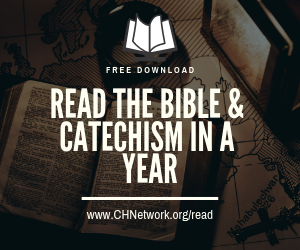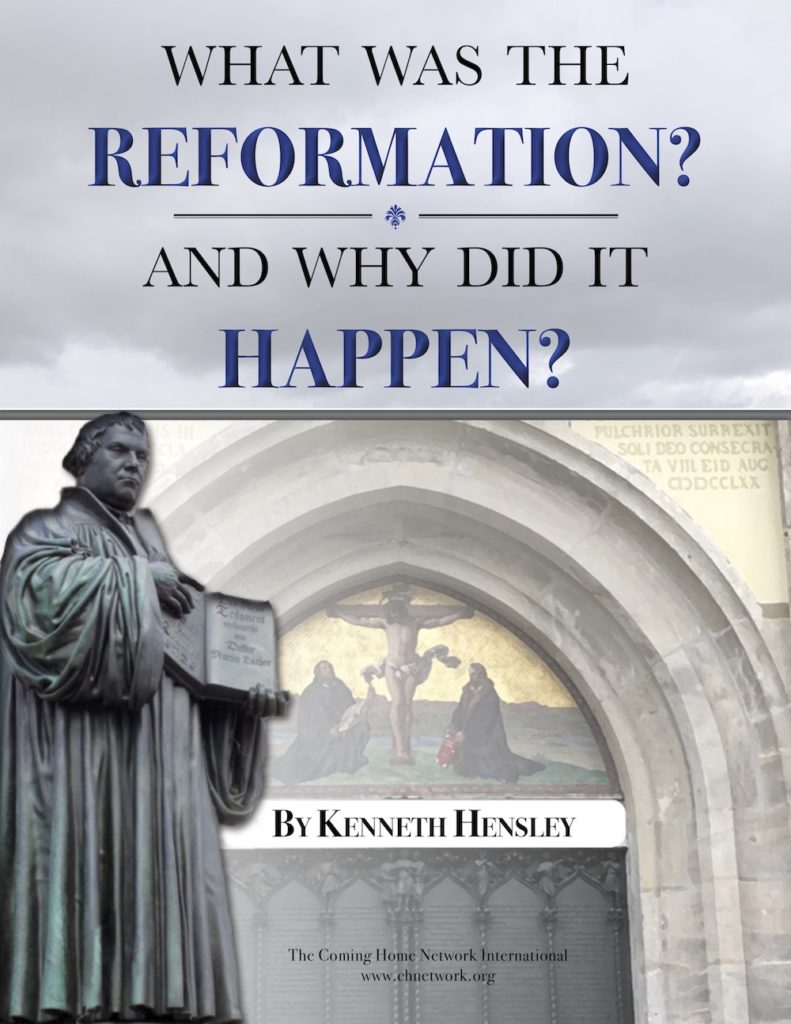
A Note from the Author
I hope in some small way the letter that follows, which I wrote to over 200 friends and family about my decision to join the Catholic Church, is of encouragement to you and perhaps offers some guidance if you are considering writing one yourself.
Before reading my letter, by way of further context, I was on Young Life staff in the late 90s. Having earned some seminary credits while on staff, I decided to complete a seminary degree at Denver Seminary. Founded as conservative Baptist seminary, Denver Seminary is now a non-denominational Protestant evangelical seminary.
I became an ordained Anglican priest in 2004, canonically resident in the Anglican Mission in America then later in the Anglican Church of North America until I came into the Catholic Church in 2018 at which time I resigned as an Anglican priest. During those 14 years, I was active as a fulltime Anglican parish priest for five years—in Florida and Arkansas—before I was able to move back to Washington, DC to chiefly pursue my long-time passion and calling to work in the intersection of proclaiming the gospel among policy leaders and advance international relief and development policy in service of the common good. While I was pursuing that career, I offered pulpit supply and spiritual direction across our Anglican diocese as I had time.
A Few Tips for Sharing Your Story
When I was ready to come into full communion with the Catholic Church, I knew it would be a good exercise to put on paper what I was doing and why—a letter to send to friends, family, former parishioners, and a few others.
I would only hope and presume you are journaling at length about your spiritual journey. But for most of us, certainly me, few will be interested in reading a novel length conversion story. Even those who love me most, if I am honest, will probably not read more than a few pages! Furthermore, you will frequently be asked conversationally “why did you convert?” The vast majority of the time, this is asked in cocktail/coffee hour type settings where the person asking the question is not prepared or interested in a four-hour life story retelling.
It was a long and excruciating exercise to get my letter down to this length. I had so much to say! But it was a good exercise. As you can read in my letter, I finally boiled my answer to “why” I became Catholic down to three themes: (1) the beauty of the Sacraments, (2) the goodness of Catholic spirituality, and (3) the truth of Catholic Social Teaching. And I have since even gotten it down to one sentence: “Because the Catholic Church is true.” G.K. Chesterton said he became Catholic because “I wanted my sins to be forgiven.” What is your reason?
I chose to avoid getting into polemics which you will see I qualified in my letter. I submit such a letter is likely not the best place to critique Protestantism or your former faith tradition. I believe a winsome account of your journey along with the beauty, goodness, and truth of the Church can speak for itself and will draw others to your story over making a polemical argument. I go into polemics and apologetics “offline” for those who are interested.
Just about all my letter recipients were non-Catholics and I received a lot of responses. Interestingly, not one of them was upset with my decision. And even more interestingly, many of those whom I thought would display objection or consternation with my decision said variations of, “This is interesting Lucas. I myself have questions about the Catholic Church. Could we talk sometime?”Those conversations continue to this day.
I hope you enjoy the read.
Blessings to you on the journey,
Lucas Koach
Arlington, VA
*****
Dear friends and family,
I am writing to share with you the news that I will be received into the Roman Catholic Church at the Easter Vigil, March 31, 2018 (8:30 p.m.) at St. Charles Catholic Church here in Arlington.
I made this final decision to be received into the Catholic church on November 10, 2017 after more than ten years of prayer and discernment.
In preface, I have never been more joyous about my faith in Jesus Christ marked by a sense of deeper commitment to His truth and His gospel. By the same token, I have never been more aware that I am a sinner—fallen, broken—in need of His grace.
I am also pleased to say I made this decision with Chrissy’s blessing. We are confident this will not hinder our children’s formation, but rather offer them richer frameworks for growing in the faith. Chrissy and the kids are happy at Restoration Anglican at this time, a community we know and love, and I will continue to join and support them there as they will join me at the Catholic church from time to time.
My purpose in this letter is not to give an argument for Catholicism over Anglicanism or some other Christian denomination. While that is certainly a critical conversation, my purpose is rather to offer you, my closest friends and family, and indeed for myself, a few words on my personal story that has led me to this decision.
As many of you know, I came to faith as a teenager through the ministry of Young Life and was blessed with many friends and mentors from that era who helped me see the winsome and penetrating reality of the person of Jesus Christ. Later, from professors at Denver Seminary, to fellow Anglican clergy, and other friends, I received discipleship and training that has formed my life and ministry. I am forever indebted to the knowledge, wisdom, holiness, and friendship of these Godly men and women.
Beauty of the Sacraments
In early adulthood, lacking a church tradition of my own, friends invited me to attend (then) Falls Church Episcopal in Falls Church, VA. At first, the liturgy and sacraments seemed foreign and rote. But before long, I learned and experienced how these visible signs of invisible truths beautifully make the transcendent physically present.
These liturgical and sacramental treasures were magnified when I became an Anglican priest. My first assignment as a priest was to an Anglo-Catholic parish in Tampa, FL. There I grew in a deeper appreciation of high church sacramental theology and practice, which helped me further appreciate the catholic nature of our Anglican tradition.
Goodness of Catholic Spirituality
Having studied pastoral counseling in seminary, I was increasingly interested in spiritual theology and formation – the discipline of how we grow in the faith (in contrast to just believing the right things about the faith). From 2005-2008, under Fr. Adrian van Kaam, C.S.Sp. and Dr. Susan Muto of the Epiphany Academy, I studied their comprehensive work of “the science, anthropology, and theology of formation.” While their work is presented in an ecumenical fashion, they themselves are Catholic working under the authority of the Catholic Church.
I began to plumb the depths of Christian spirituality from the indispensable doctors and saints of the Catholic Church. Even the professors Chrissy and I had at Denver Seminary (founded as a Baptist seminary in the 1950s) would regularly draw upon this treasury of the Catholic Church as many emerging spiritual formation programs at evangelical seminaries are now doing.
Truth of Catholic Social Teaching
Working in the area of public policy for a global Christian humanitarian organization, I regularly contend with the question of how a faith-based organization ought to partner with the government. In a culture of subjective relativism, how do we articulate universal principles for the greater good of humanity before the US government, before the UN? From where are those principles derived? Important questions, as our faith not only makes particular religious dogmatic assertions, but indeed our faith deeply informs a wider understanding of the dignity of mankind and the essence of human freedom—notions a just government is obliged to uphold.
Unfortunately, in today’s world, we are all too familiar with the contentious nature of public discourse and outright perpetration of evil. Catholic social teaching provides a comprehensive, coherent, and consistent foundation to be able to articulate the just and the good in service of humanity. This treasury has given me a growing appreciation for the church’s voice on issues of justice besetting our broken world that all people of good will can ascertain and support.
A Question of Authority
Over the past ten years particularly of active discernment, I have done a good bit of homework working through my own difficulties with the Catholic Church, which is all necessary and appropriate for one to do. But I have also come to realize, in our day and age we easily choose and fashion our faith according to that which we agree with. If I am not cautious, I design a faith or an understanding of the faith to my personal sensibilities alone. The problem is I can remain the sole arbiter of my faith expression. While faith fully invites and indeed demands engagement of one’s intellect and the will, in the end faith requires us to yield our will to something that is, if we are honest, vastly mysterious. Surety must always be characterized by humility. We must give up our own authority and place it not merely in our understanding of God, but in God Himself.
In the end, one must decide not whether or not they believe in Catholicism but, rather, is the Catholic Church true? Historically, I naturally focused on the former question, but in recent years I have striven to focus on the latter. As such, the answer I arrived at is the same as that of the Protestant convert Richard John Neuhaus as he writes in the forward to Thomas Howard’s Lead, Kindly Light (paraphrasing) “When after many years of wresting with it and I could no longer answer ‘no’ to that question in a manner convincing to myself, I became Catholic. Becoming a Catholic is not a matter of preference but of duty freely embraced.”
My disagreements on doctrine and discipline grew thinner and thinner over the years while its beauty, goodness and truth became more and more vivid. At the same time, I have no disillusion about any human shortcomings of this divine institution or any institution.
While my decision is marked by joy and surety, it is also marked by timidity if not humility. Many aspects of Catholic dogma and practices I enthusiastically resound with, others I will have to further study and live into to fully appreciate. But in all of them I am now prepared to submit myself by faith and humility. Beyond agreeing with the Catholic Church, I am hereby submitting myself to the authority of the Catholic Church.
A Thinning Divide and My Future?
Today, at the 500-year anniversary of the Protestant Reformation, theological divides between Catholics and Protestants have arguably never been thinner. Relations among Anglicans and the Catholic Church have also become more generous. Many Anglicans, who are among the closest to Catholicism in form, practice, and tradition, have joined the Roman Catholic Church in recent years. In 1980 and later in 2009, both Pope John Paul II and Pope Benedict XVI passed extraordinary provisions (called the Pastoral Provision and the personal ordinariate respectively) allowing Anglican clergy and parishes to become Roman Catholic. While the Catholic Church does not acknowledge the validity of Anglican ordination, these provisions do make married former Anglican priests eligible for Catholic priesthood. Many have naturally asked me about this possibility. My greatest aspiration will be to become a humble disciple and strive to become a good Catholic. This alone can and will easily consume the remainder of my life here on this earth. While I wish to continue to actively serve Christ in my career-vocation, I don’t foresee ordination as an immanent consideration. Though, for me—and for us all—may we have the grace to pray the prayer of St. Teresa of Avila, “Lord, dispose of my life however you see fit.”
In closing, I wish to quote John Henry Newman, the 19th century Anglican clergyman who converted to the Catholic Church. He has been a guide for me these recent years. His words embody my prayer for my friends and family. I hope they will capture the spirit of your prayers for me:
Year passes after year silently; Christ’s coming is ever nearer than it was. O that, as He comes nearer earth, we may approach nearer heaven! O, my brethren, pray Him to give you the heart to seek Him in sincerity. Pray Him to give you what Scripture calls “an honest and good heart,” or “a perfect heart,” and, without waiting, begin at once to obey Him with the best heart you have. To do what He bids is to obey Him, and to obey Him is to approach Him. Every act of obedience is an approach—an approach to Him who is not far off, though He seems so, but close behind this visible screen of things which hides Him from us. He is behind this material framework; earth and sky are but a veil going between Him and us; the day will come when He will rend that veil, and show Himself to us. May this be the portion of every one of us! It is hard to attain it; but it is woeful to fail. Life is short; death is certain; and the world to come is everlasting.’
With great love,





